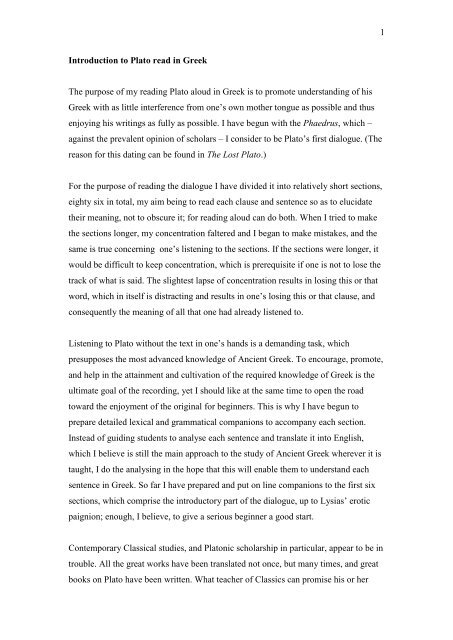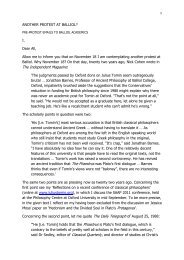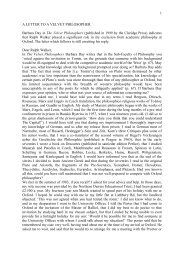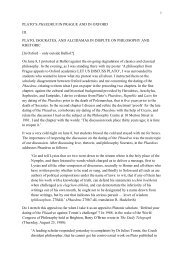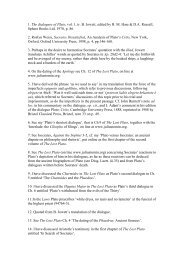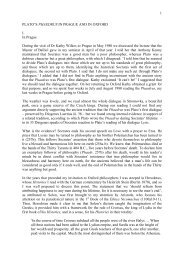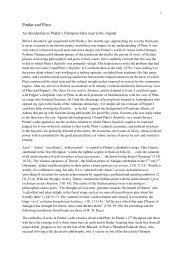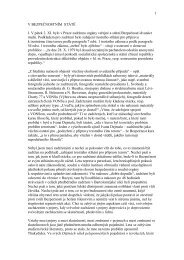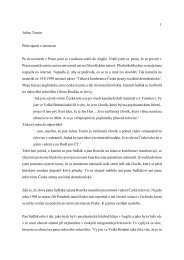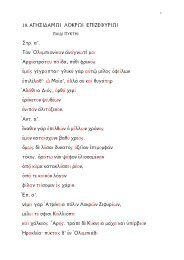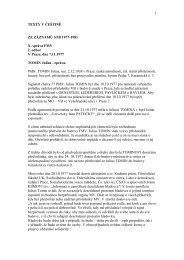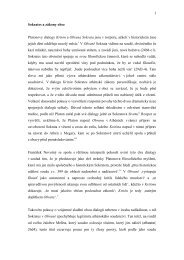Introduction to Plato read in Greek - Julius Tomin
Introduction to Plato read in Greek - Julius Tomin
Introduction to Plato read in Greek - Julius Tomin
Create successful ePaper yourself
Turn your PDF publications into a flip-book with our unique Google optimized e-Paper software.
1<br />
<strong>Introduction</strong> <strong>to</strong> Pla<strong>to</strong> <strong>read</strong> <strong>in</strong> <strong>Greek</strong><br />
The purpose of my <strong>read</strong><strong>in</strong>g Pla<strong>to</strong> aloud <strong>in</strong> <strong>Greek</strong> is <strong>to</strong> promote understand<strong>in</strong>g of his<br />
<strong>Greek</strong> with as little <strong>in</strong>terference from one’s own mother <strong>to</strong>ngue as possible and thus<br />
enjoy<strong>in</strong>g his writ<strong>in</strong>gs as fully as possible. I have begun with the Phaedrus, which –<br />
aga<strong>in</strong>st the prevalent op<strong>in</strong>ion of scholars – I consider <strong>to</strong> be Pla<strong>to</strong>’s first dialogue. (The<br />
reason for this dat<strong>in</strong>g can be found <strong>in</strong> The Lost Pla<strong>to</strong>.)<br />
For the purpose of <strong>read</strong><strong>in</strong>g the dialogue I have divided it <strong>in</strong><strong>to</strong> relatively short sections,<br />
eighty six <strong>in</strong> <strong>to</strong>tal, my aim be<strong>in</strong>g <strong>to</strong> <strong>read</strong> each clause and sentence so as <strong>to</strong> elucidate<br />
their mean<strong>in</strong>g, not <strong>to</strong> obscure it; for <strong>read</strong><strong>in</strong>g aloud can do both. When I tried <strong>to</strong> make<br />
the sections longer, my concentration faltered and I began <strong>to</strong> make mistakes, and the<br />
same is true concern<strong>in</strong>g one’s listen<strong>in</strong>g <strong>to</strong> the sections. If the sections were longer, it<br />
would be difficult <strong>to</strong> keep concentration, which is prerequisite if one is not <strong>to</strong> lose the<br />
track of what is said. The slightest lapse of concentration results <strong>in</strong> los<strong>in</strong>g this or that<br />
word, which <strong>in</strong> itself is distract<strong>in</strong>g and results <strong>in</strong> one’s los<strong>in</strong>g this or that clause, and<br />
consequently the mean<strong>in</strong>g of all that one had al<strong>read</strong>y listened <strong>to</strong>.<br />
Listen<strong>in</strong>g <strong>to</strong> Pla<strong>to</strong> without the text <strong>in</strong> one’s hands is a demand<strong>in</strong>g task, which<br />
presupposes the most advanced knowledge of Ancient <strong>Greek</strong>. To encourage, promote,<br />
and help <strong>in</strong> the atta<strong>in</strong>ment and cultivation of the required knowledge of <strong>Greek</strong> is the<br />
ultimate goal of the record<strong>in</strong>g, yet I should like at the same time <strong>to</strong> open the road<br />
<strong>to</strong>ward the enjoyment of the orig<strong>in</strong>al for beg<strong>in</strong>ners. This is why I have begun <strong>to</strong><br />
prepare detailed lexical and grammatical companions <strong>to</strong> accompany each section.<br />
Instead of guid<strong>in</strong>g students <strong>to</strong> analyse each sentence and translate it <strong>in</strong><strong>to</strong> English,<br />
which I believe is still the ma<strong>in</strong> approach <strong>to</strong> the study of Ancient <strong>Greek</strong> wherever it is<br />
taught, I do the analys<strong>in</strong>g <strong>in</strong> the hope that this will enable them <strong>to</strong> understand each<br />
sentence <strong>in</strong> <strong>Greek</strong>. So far I have prepared and put on l<strong>in</strong>e companions <strong>to</strong> the first six<br />
sections, which comprise the <strong>in</strong>troduc<strong>to</strong>ry part of the dialogue, up <strong>to</strong> Lysias’ erotic<br />
paignion; enough, I believe, <strong>to</strong> give a serious beg<strong>in</strong>ner a good start.<br />
Contemporary Classical studies, and Pla<strong>to</strong>nic scholarship <strong>in</strong> particular, appear <strong>to</strong> be <strong>in</strong><br />
trouble. All the great works have been translated not once, but many times, and great<br />
books on Pla<strong>to</strong> have been written. What teacher of Classics can promise his or her
2<br />
students that a great book on Homer, Aeschylus or Herodotus is what he or she, and<br />
the culturally demand<strong>in</strong>g public, are expect<strong>in</strong>g of them? What teacher of Ancient<br />
Philosophy can <strong>in</strong>spire their students with the ambition of writ<strong>in</strong>g a great book on<br />
Pla<strong>to</strong> or Aris<strong>to</strong>tle, surpass<strong>in</strong>g <strong>in</strong> orig<strong>in</strong>ality and scholarly rigour all that has been<br />
achieved by past generations of scholars? If Classical studies are <strong>to</strong> survive <strong>in</strong> any<br />
worthwhile form, then the whole purpose of this enterprise must completely change.<br />
The question must be what can the study of Homer and Herodotus, of Euripides and<br />
Aris<strong>to</strong>phanes, of Pla<strong>to</strong> and Aris<strong>to</strong>tle br<strong>in</strong>g <strong>to</strong> the life and <strong>to</strong> the moral and <strong>in</strong>tellectual<br />
well-be<strong>in</strong>g of those who undertake it. In br<strong>in</strong>g<strong>in</strong>g this question <strong>in</strong><strong>to</strong> focus,<br />
understand<strong>in</strong>g the great treasures of the <strong>Greek</strong> literary heritage <strong>in</strong> the orig<strong>in</strong>al, with as<br />
little <strong>in</strong>terference from one’s mother <strong>to</strong>ngue as possible, becomes imperative. If this is<br />
<strong>to</strong> be attempted, then such companions as I have prepared for the first six sections of<br />
the Phaedrus ought <strong>to</strong> be prepared for all dialogues of Pla<strong>to</strong>, for all the major works<br />
of Aris<strong>to</strong>tle, for Homer, Herodotus and Thucydides, <strong>in</strong> short, for all the major works<br />
of the Ancient <strong>Greek</strong>s. Students ought <strong>to</strong> be provided with an opportunity of enter<strong>in</strong>g<br />
the world of the Ancient <strong>Greek</strong>s start<strong>in</strong>g with any of those works. But approach<strong>in</strong>g the<br />
orig<strong>in</strong>al texts with such l<strong>in</strong>guistic companions is only the first step. A serious student<br />
of Pla<strong>to</strong> should aim at deriv<strong>in</strong>g the elucidation of the <strong>Greek</strong> texts from the texts as<br />
such; <strong>to</strong> achieve this one cannot be satisfied with <strong>read</strong><strong>in</strong>g one, two, or three dialogues<br />
of Pla<strong>to</strong>, one must <strong>read</strong> the whole of Pla<strong>to</strong> <strong>in</strong> the orig<strong>in</strong>al, and <strong>to</strong> do so not only once,<br />
but many times, and not only Pla<strong>to</strong>, but all the great works of the <strong>Greek</strong> poets,<br />
his<strong>to</strong>rians and rhe<strong>to</strong>ricians, beg<strong>in</strong>n<strong>in</strong>g with Homer.<br />
At this po<strong>in</strong>t you may object: but this would take a lifetime of s<strong>in</strong>gle-m<strong>in</strong>ded<br />
devotion. Who can possibly have time for such an enormous task, what society could<br />
fund an endeavour, which at its best would be limited <strong>to</strong> only a few? If the only<br />
honest alternative is the death of Classical studies and Ancient Philosophy, so let them<br />
die. And anyway, if there is anyth<strong>in</strong>g of last<strong>in</strong>g <strong>in</strong>terest <strong>in</strong> them, one can get it from<br />
the many translations of those works that we have! I can vouch for it that at least as<br />
far as Pla<strong>to</strong> is concerned even the best translations impoverish and dis<strong>to</strong>rt his thought.<br />
(In The Lost Pla<strong>to</strong> many such dis<strong>to</strong>rtions are po<strong>in</strong>ted out and discussed; see esp. Ch 3<br />
‘A critical review of doctr<strong>in</strong>al arguments for and aga<strong>in</strong>st the late dat<strong>in</strong>g of the<br />
Phaedrus’, and Ch 9 ‘Pla<strong>to</strong>’s shortest dialogue’ <strong>to</strong>gether with ‘The Interlude: The<br />
Cli<strong>to</strong>pho of Sl<strong>in</strong>gs’.) But even if one granted me this po<strong>in</strong>t, one might object that
3<br />
<strong>read</strong><strong>in</strong>g Pla<strong>to</strong> aloud and listen<strong>in</strong>g <strong>to</strong> his dialogues does not facilitate understand<strong>in</strong>g of<br />
his thought. The very speed with which one must apprehend the text when listen<strong>in</strong>g <strong>to</strong><br />
its be<strong>in</strong>g <strong>read</strong> aloud is an obstacle; <strong>to</strong> understand the text properly one must have time<br />
<strong>to</strong> digest it, <strong>to</strong> thoroughly comprehend each sentence, each paragraph, each dialogue<br />
as a whole both on its own and with<strong>in</strong> the context of the Pla<strong>to</strong>nic Corpus <strong>in</strong> its <strong>to</strong>tality.<br />
This can be achieved only by perceiv<strong>in</strong>g the text through the eyes, which allows us <strong>to</strong><br />
dwell on each word, clause, sentence, paragraph and dialogue as long as is needed.<br />
At this po<strong>in</strong>t I must confess that when I began <strong>to</strong> record my <strong>read</strong><strong>in</strong>g of Pla<strong>to</strong>, I did it<br />
solely with my own needs <strong>in</strong> m<strong>in</strong>d. Some time ago my eyesight suddenly sharply<br />
deteriorated, which was caused by the blockage of some of the t<strong>in</strong>y arteries on the<br />
ret<strong>in</strong>a. I began <strong>to</strong> be seriously worried that soon a day would come when I should be<br />
unable <strong>to</strong> <strong>read</strong> <strong>Greek</strong> texts. Luckily, I stumbled upon an eye exercise which unblocked<br />
the arteries. When that happened, I became determ<strong>in</strong>ed <strong>to</strong> make sure that any future<br />
loss of my eyesight would not deprive me of my enjoy<strong>in</strong>g the <strong>Greek</strong>s, and Pla<strong>to</strong> <strong>in</strong><br />
particular. This is why I began <strong>to</strong> record the Phaedrus. I knew of course that I had <strong>to</strong><br />
familiarize myself anew with the text of each section by <strong>read</strong><strong>in</strong>g it silently before<br />
record<strong>in</strong>g it, which I dutifully did. But <strong>to</strong> my surprise, <strong>in</strong> my attempt <strong>to</strong> convey the<br />
mean<strong>in</strong>g of each sentence adequately when <strong>read</strong><strong>in</strong>g it aloud I failed miserably. I<br />
erased the record<strong>in</strong>g prior <strong>to</strong> listen<strong>in</strong>g <strong>to</strong> it, and started aga<strong>in</strong> from scratch. I became<br />
satisfied with my next attempt at record<strong>in</strong>g as I was do<strong>in</strong>g it, but when I listened <strong>to</strong> the<br />
record<strong>in</strong>g with my eyes closed I realized that I still failed <strong>to</strong> convey the mean<strong>in</strong>g of<br />
each sentence properly. And so I erased the record<strong>in</strong>g and started aga<strong>in</strong>, until I<br />
became satisfied that my <strong>read</strong><strong>in</strong>g elucidated the text <strong>in</strong>stead of dis<strong>to</strong>rt<strong>in</strong>g and<br />
obfuscat<strong>in</strong>g it. When that happened, I became aware that my listen<strong>in</strong>g <strong>to</strong> what I had<br />
recorded opened for me an entirely new way of experienc<strong>in</strong>g and enjoy<strong>in</strong>g the text.<br />
So far I have recorded and put on my website the Phaedrus, the Charmides, and the<br />
Hippias Major. I will soon be add<strong>in</strong>g record<strong>in</strong>gs of the Lysis, Hippias M<strong>in</strong>or,<br />
Cli<strong>to</strong>pho, Meno and Euthyphro. But the difficulty that I encountered when record<strong>in</strong>g<br />
the first section of the Phaedrus rema<strong>in</strong>s basically the same; it is only with the third,<br />
or at best with the second record<strong>in</strong>g that I can be satisfied. What can be the reason for<br />
it? What causes the gap between perceiv<strong>in</strong>g the mean<strong>in</strong>g of each sentence and each<br />
section <strong>to</strong> my full satisfaction <strong>in</strong> the course of the <strong>in</strong>itial <strong>read</strong><strong>in</strong>g, when I do so
4<br />
silently, and then attempt<strong>in</strong>g <strong>to</strong> convey that mean<strong>in</strong>g adequately when I <strong>read</strong> the text<br />
aloud? I th<strong>in</strong>k that the structure and the function of our bra<strong>in</strong> provides the answer <strong>to</strong><br />
this paradox. The visual cortex is located <strong>in</strong> a different part of bra<strong>in</strong> from the audi<strong>to</strong>ry<br />
one, and both are located <strong>in</strong> a different part from the one that br<strong>in</strong>gs <strong>in</strong><strong>to</strong> action and<br />
regulates our speech organs. If one is <strong>to</strong> <strong>read</strong> the given text aloud so as <strong>to</strong> elucidate its<br />
mean<strong>in</strong>g, the activity of these disparate parts of bra<strong>in</strong> must be fully <strong>in</strong>tegrated <strong>in</strong><strong>to</strong> one<br />
<strong>in</strong> the process of appropriation and communication of the mean<strong>in</strong>g of the given text.<br />
But this cannot be the whole s<strong>to</strong>ry, for this does not expla<strong>in</strong> how it can happen that I<br />
can become satisfied with the record<strong>in</strong>g when I am do<strong>in</strong>g it, and yet be dissatisfied<br />
with it when f<strong>in</strong>ally listen<strong>in</strong>g <strong>to</strong> it with my eyes closed, for <strong>in</strong> both cases the audi<strong>to</strong>ry<br />
function of the bra<strong>in</strong> is fully activated and employed. Part of the answer may be that<br />
listen<strong>in</strong>g <strong>to</strong> the text with my eyes closed I can fully concentrate on critically assess<strong>in</strong>g<br />
the degree <strong>to</strong> which I succeeded <strong>in</strong> convey<strong>in</strong>g the mean<strong>in</strong>g of the text properly. But<br />
aga<strong>in</strong>, this cannot be the crux of the matter, for, paradoxically, I f<strong>in</strong>d my listen<strong>in</strong>g <strong>to</strong><br />
the text <strong>to</strong> be by far the most demand<strong>in</strong>g, yet at the same time most reward<strong>in</strong>g<br />
activity. So what may be the reason for it? I believe that <strong>in</strong> purely listen<strong>in</strong>g <strong>to</strong> the text<br />
the deepest strata of our be<strong>in</strong>g becomes engaged, for the <strong>in</strong>terconnection between our<br />
th<strong>in</strong>k<strong>in</strong>g and the audi<strong>to</strong>ry expression of our thought is by far the oldest connection,<br />
preced<strong>in</strong>g the connection between the written word and thought by dozens of<br />
millennia. Furthermore, when we th<strong>in</strong>k our thoughts emerge from the subconscious <strong>in</strong><br />
audi<strong>to</strong>ry form – we hear the words <strong>in</strong> our m<strong>in</strong>d, we do not see them written. It is this<br />
most fundamental level of <strong>in</strong>terconnection between the subconscious and the<br />
articulation of thought <strong>in</strong> our m<strong>in</strong>d that is directly and exclusively <strong>in</strong>volved and<br />
engaged <strong>in</strong> pure listen<strong>in</strong>g <strong>to</strong> the text.<br />
When I <strong>read</strong> and listen <strong>to</strong> a given section of the Phaedrus, I do not even th<strong>in</strong>k of<br />
Pla<strong>to</strong>, let alone the dat<strong>in</strong>g and <strong>in</strong>terpretation of his dialogues; I am fully preoccupied<br />
with the task of understand<strong>in</strong>g what Socrates wants <strong>to</strong> say <strong>to</strong> Phaedrus and Phaedrus<br />
<strong>to</strong> Socrates. I am beg<strong>in</strong>n<strong>in</strong>g <strong>to</strong> believe that these brief and <strong>in</strong>tensive excursions <strong>in</strong><strong>to</strong><br />
<strong>Greek</strong> thought, which each section represents, allow me <strong>to</strong> go beyond Pla<strong>to</strong>, <strong>to</strong><br />
immerse myself <strong>in</strong> the most fundamental structures of Ancient <strong>Greek</strong> on the basis of<br />
which and <strong>in</strong> the <strong>in</strong>teraction with which Pla<strong>to</strong>’s thought was generated. This is why I<br />
should like <strong>to</strong> do the same not only with the rest of Pla<strong>to</strong>’s dialogues, but with<br />
Xenophon and Aris<strong>to</strong>tle, Herodotus, Thucydides, Lysias, Isocrates and Demosthenes.
5<br />
I hope that Classical scholars will jo<strong>in</strong> me and that we will thus jo<strong>in</strong>tly open the<br />
possibility of full enjoyment of Homer, Aeschylus, Sophocles, Euripides, and<br />
Aris<strong>to</strong>phanes for ourselves and for the com<strong>in</strong>g generations.<br />
Paradoxically, the greater <strong>in</strong>tellectual and moral benefits one derives from thus<br />
immers<strong>in</strong>g oneself <strong>in</strong> the world of Pla<strong>to</strong> and of the Ancient <strong>Greek</strong>s, the greater<br />
contribution one can make <strong>to</strong> the most press<strong>in</strong>g tasks <strong>in</strong> front of which mank<strong>in</strong>d now<br />
stands. The premises on which our capitalist system runs are unsusta<strong>in</strong>able. Produc<strong>in</strong>g<br />
more and more goods will destroy the very possibility of existence on this planet.<br />
Humans must focus on satisfy<strong>in</strong>g and cultivat<strong>in</strong>g our true physical and <strong>in</strong>tellectual<br />
needs, and thus on our true well-be<strong>in</strong>g. What are our true physical, moral, and<br />
<strong>in</strong>tellectual needs? The needs the satisfaction of which allows each of us <strong>to</strong> aspire <strong>to</strong><br />
atta<strong>in</strong><strong>in</strong>g our physical, moral, and <strong>in</strong>tellectual optimum. Each of us is different, the<br />
ways of pursu<strong>in</strong>g our optimum is different for each of us. In physical terms, not<br />
everyone can reach his or her optimum by climb<strong>in</strong>g Mt Everest, but this does not<br />
mean that climb<strong>in</strong>g mounta<strong>in</strong>s should not be open <strong>to</strong> all those who can enjoy it and<br />
derive benefit from it. Appropriat<strong>in</strong>g the <strong>Greek</strong>s <strong>to</strong> the full is not open <strong>to</strong> everyone,<br />
but those of us who have the <strong>in</strong>tellectual capacity <strong>to</strong> make the world of the Ancients<br />
their own and share their experience with others do themselves a disservice if they let<br />
their ability atrophy, their potential rema<strong>in</strong> unfulfilled, and <strong>in</strong> do<strong>in</strong>g so they<br />
impoverish all of mank<strong>in</strong>d.


